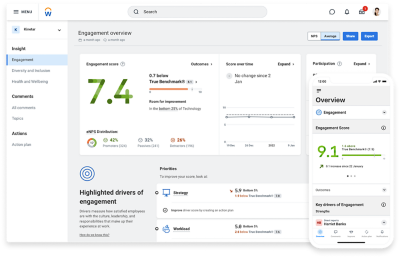WORKDAY PEAKON EMPLOYEE VOICE
Understand engagement. Boost productivity.
Our intelligent listening platform gives you the real-time insight you need for engaging and empowering your teams.

Trusted by some of the world’s leading companies.






EMPLOYEE VOICE SOLUTIONS
Act fast on feedback.
Employee Engagement
Listen to and understand your employees so you can help them perform at their best and drive positive business outcomes.
Employee Retention
Identify the root causes of employee turnover, and forecast the risk of attrition within your organization to keep your top talent.
Leadership Development
Empower leaders with science-backed action plans and training resources that have been proven to work.
Diversity, Equity, and Inclusion
Identify opportunities to focus your diversity and inclusion efforts and make more strategic, evidence-based decisions.
Employee Health and Well-Being
Get proactive about the health of your people, and adapt your initiatives based on the changing needs of your employees.
Transformation and Change
Put employees at the center of your transformation efforts to sustain positive change and improve business performance.

Explore the employee voice advantage.
Employee-centric for first-rate experiences.
Put employees at the center of the experience, from hire to retire, by asking the right questions and at the right time for insights that are ready for action.
A bigger dataset means better insights.
Accurate comparisons, consistent benchmarking, and robust analytical models help leaders know what they need to do to create change.
Deliver insights at scale with AI.
Advanced AI and natural language processing help identify critical themes raised by your people so you can take immediate action that drives long-lasting change.
A scientific understanding of employee sentiment.
Leverage scientifically validated question libraries combining decades of academic research with the latest data science to better understand employee experience in the workplace.
Benefits that make a big difference.
Take a proactive approach to listening.
Optimal employee experiences start with understanding the sentiment of your people across different areas of the employee lifecycle and taking action to promote positive change.
Adapt your people initiatives in real time.
Get real-time feedback about what your employees need so they can perform at their best—and link sentiment to KPIs to see the impact of your people initiatives.
Put your employees in the driver’s seat.
Empower everyone to drive change with personalized dashboards, providing both people leaders and employees with insights and guidance unique to them.
See how we get you up and running fast.